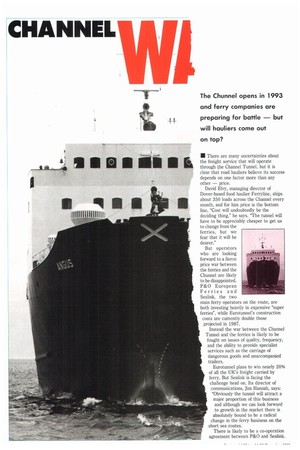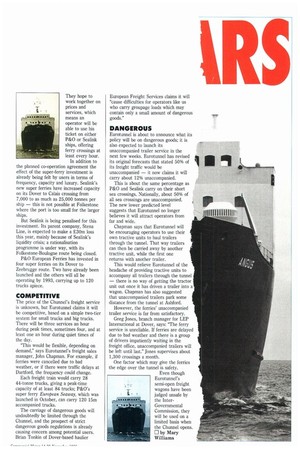The Chunnel opens in 1993 and ferry companies are preparing for battle — but will hauliers come out on top?
Page 42

Page 43

If you've noticed an error in this article please click here to report it so we can fix it.
• There are many uncertainties about the freight service that will operate through the Channel Tunnel, but it is clear that road hauliers believe its success depends on one factor more than any other — price.
David Elvy, managing director of Dover-based food haulier Ferryline, ships about 350 loads across the Channel every month, and for him price is the bottom line. "Cost will undoubtedly be the deciding thing," he says. "The tunnel will have to be appreciably cheaper to get us to change from the ferries, but we fear that it will be dearer."
But operators who are looking forward to a fierce price war between the ferries and the Chunnel are likely to be disappointed. P&O European Ferries and Sealink, the two main ferry operators on the route, are both investing heavily in expensive "super ferries", while Eurotwmel's construction costs are currently double those projected in 1987.
Instead the war between the Channel Tunnel and the ferries is likely to be fought on issues of quality, frequency, and the ability to provide specialist services such as the carriage of dangerous goods and unaccompanied trailers.
Eurotunnel plans to win nearly 20% of all the UK's freight carried by ferry. But Sealink is facing the challenge head on. Its director of communications, Jim Hannah, says: "Obviously the tunnel will attract a major proportion of this business and although we can look forward to growth in the market there is absolutely bound to be a radical change in the ferry business on the short sea routes.
There is likely to be a co-operation agreement between P&O and Sealink. They hope to work together on prices and services, which means an operator will be able to use his ticket on either P&O or Sealink ships, offering ferry crossings at least every hour.
In addition to the planned co-operation agreement the effect of the super-ferry investment is already being felt by users in terms of frequency, capacity and luxury. Sealink's new super ferries have increased capacity on its Dover to Calais crossing from 7,000 to as much as 25,000 tonnes per ship — this is not possible at Folkestone where the port is too small for the larger ships.
But Sealink is being penalised for this investment. Its parent company, Stena Line, is expected to make a £30m loss this year, mainly because of Sealink's liquidity crisis; a rationalisation programme is under way, with its Folkestone-Boulogne route being closed.
P&O European Ferries has invested in four super ferries on its Dover to Zeebrugge route. Two have already been launched and the others will all be operating by 1993, carrying up to 120 trucks apiece.
COMPETITIVE
The price of the Chunnel's freight service is unknown, but Eurotunnel claims it will be competitive, based on a simple two-tier system for small trucks and big trucks. There will be three services an hour during peak times, sometimes four, and at least one an hour during quiet times of the day.
"This would be flexible, depending on demand," says Eurotunnel's freight sales manager, John Chapman. For example, if ferries were cancelled due to bad weather, or if there were traffic delays at Dartford, the frequency could change.
Each freight train would carry 28 44-tonne trucks, giving a peak-time capacity of at least 84 trucks; P&O's super ferry European Seaway, which was launched in October, can carry 120 15m accompanied trucks.
The carriage of dangerous goods will undoubtedly be limited through the Chunnel, and the prospect of strict dangerous goods regulations is already causing concern among potential users. Brian Tonkin of Dover-based haulier European Freight Services claims it will "cause difficulties for operators like us who carry groupage loads which may contain only a small amount of dangerous goods."
DANGEROUS
Eurotunnel is about to announce what its policy will be on dangerous goods; it is also expected to launch its unaccompanied trailer service in the next few weeks. Eurotunnel has revised its original forecasts that stated 50% of its freight traffic would be unaccompanied — it now claims it will carry about 12% unaccompanied.
This is about the same percentage as P&O and Sealink carry on their short sea crossings. Nationally, about 50% of all sea crossings are unaccompanied. The new lower predicted level suggests that Eurotunnel no longer believes it will attract operators from far and wide.
Chapman says that Eurotunnel will be encouraging operators to use their own tractive units to haul trailers through the tunnel. That way trailers can then be carried away by another tractive unit, while the first one returns with another trailer.
This would relieve Eurotunnel of the headache of providing tractive units to accompany all trailers through the tunnel — there is no way of getting the tractor unit out once it has driven a trailer into a wagon. Chapman has also suggested that unaccompanied trailers park some distance from the tunnel at Ashford.
However, the ferries' unaccompanied trailer service is far from satisfactory.
Greg Jones, branch manager for LEP International at Dover, says: "The ferry service is unreliable. If ferries are delayed due to bad weather and there is a group of drivers impatiently waiting in the freight office, unaccompanied trailers will be left until last." Jones supervises about 1,300 crossings a month.
One factor which may give the ferries the edge over the tunnel is safety.
Even though Eurotunnel's semi-open freight wagons have been judged unsafe by the InterGovernmental Commission, they will be used on a limited basis when the Chunnel opens.
by Mary Williams




















































































